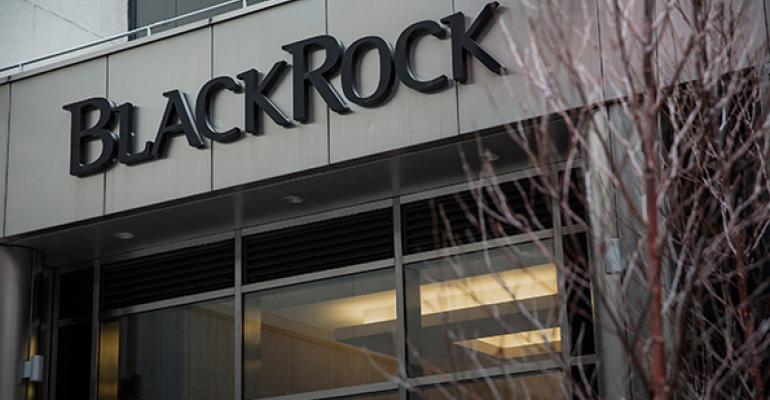By Stephen Gandel
(Bloomberg Opinion) -- BlackRock used to be able to skip over market mayhem. Now it seems as if the ground is shifting under it.
The S&P 500 Index rose 13 percent in the first quarter, a big snap back from 2018, when it was down 6 percent. BlackRock’s earnings did fall last year, but the world’s largest asset-management firm was still able to produce a relatively impressive 4.5 percent increase in sales. That was something it was not able to reproduce in the first quarter. Sales fell 7 percent from a year ago, despite the rising market.
Nonetheless, there were plenty of bright spots in the quarter. Assets under management rose an impressive $539 billion. And although much of that had to do with the rising market, BlackRock did attract a net $65 billion of new assets, which was $8 billion more than it did in the quarter a year ago. BlackRock’s earnings were also better than analysts were expecting, coming in at $6.61 a share. That was still down slightly from $6.68 a year ago, when the market in the same period was up much less than it was in the first three months of this year. That’s not how it’s supposed to work.
As a large financial firm, it’s always going to be pretty hard to be immune from the market. But as Wall Street businesses go, asset management is pretty stable. BlackRock had another advantage in fighting bad times, a storied risk management system, Aladdin, that was always even more in demand when the market was down than when it was up. Earnings dropped in 2008, but they quickly recovered, and BlackRock was able to use its relative financial strength coming out of the financial crisis to snap up the iShares ETF business, which has been the engine of growth ever since and allowed it to more than double assets in the past decade to $6.5 trillion.
Along the way, investors paid up for that stability, even if growth was far slower than, say, a tech stock, and profitability was far lower than an investment bank. Now they appear to be questioning whether they are getting what they paid for. While asset-management fees are recurring, unlike say managing stock or bond offerings, BlackRock has been dragged into a price war, and it’s massive index fund business is at the heart of it. Fidelity has slashed fees for four of its index funds to zero. There are even some small competitors that are offering to pay investors to manage their money. That’s sucking revenue out of the asset-management business. Five years ago, BlackRock consistently pulled in about 0.25 cents in revenue a year for every dollar that it managed. Last year, that figure dropped to 0.23 cents. And in the first quarter, it tumbled again to 0.21 cents.
BlackRock is showing that it’s trying to get out in front of this revenue rate decline. Earlier this year, it eliminated 500 jobs and pledged to streamline its businesses. That is likely what helped its bottom line this quarter. What’s more, the company’s board, in a rare example of good governance on Wall Street, cut CEO Larry Fink’s pay last year 14 percent. Those moves should encourage investors.
But cutting costs will only get you so far. Investors last year readjusted what they think BlackRock’s shares should be worth, though the stock has rebounded a bit this year. BlackRock’s shares now trade at 16 times forward 12 month earnings, down from 21 at the beginning of last year. But that’s still higher than the 12 P/E it traded for in 2011. If BlackRock’s revenue per dollar managed continues to fall, what investors are willing to pay for its shares will most likely sink as well.
Stephen Gandel is a Bloomberg Opinion columnist covering banking and equity markets. He was previously a deputy digital editor for Fortune and an economics blogger at Time. He has also covered finance and the housing market.
To contact the author of this story: Stephen Gandel at [email protected]
For more columns from Bloomberg View, visit bloomberg.com/view





